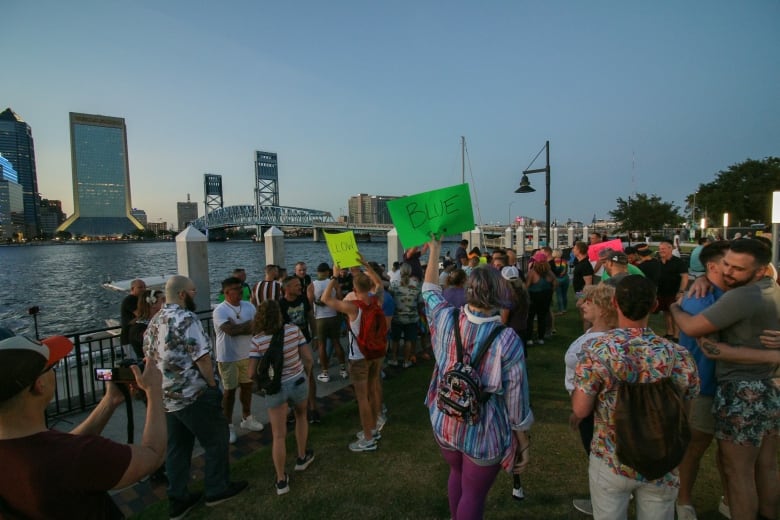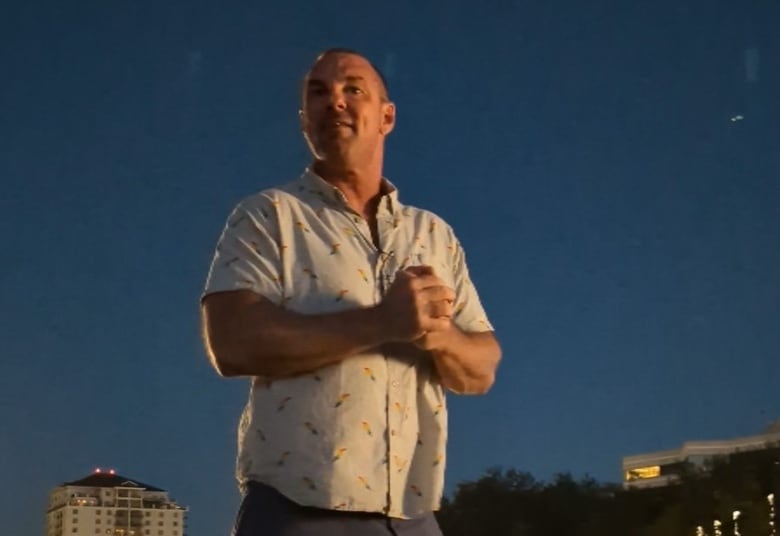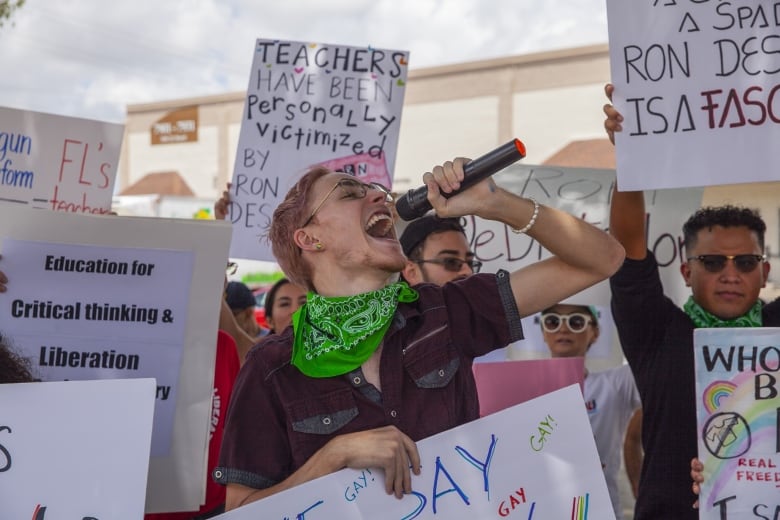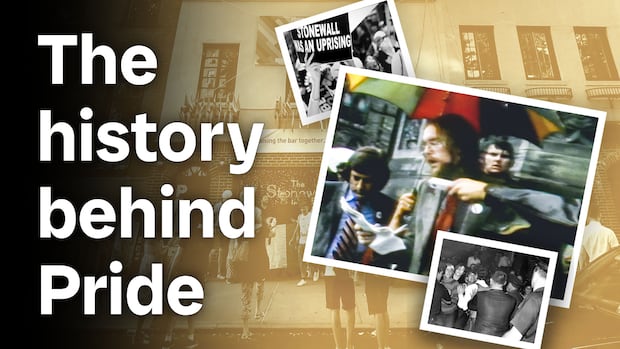Matt McAllister was dismayed to learn that there would be no display of rainbow lights illuminating the bridge in his home of Jacksonville, Fla., for Pride month this year. For him, it was yet another sign of the state government’s disdain for the 2SLGBTQ community.
Jacksonville’s Acosta bridge, spanning the St. Johns River, is one of many across the state that are only being lit up in red, white and blue from Memorial Day until Labour Day this year.
Florida Department of Transportation Secretary Jared Purdue ordered the all-American light display, to coincide with what Republican Gov. Ron DeSantis declared Freedom Summer — a tax holiday for some recreational activities and supplies — effectively barring all other illuminations for celebrations like Pride month, which began on June 1.
Rather than getting angry, McAllister got creative. On the eve of Pride month, he helped organize a rainbow rebellion of sorts, to create a colourful light display across another nearby bridge in a show of support, solidarity and celebration of the 2SLGBTQ+ community.
“We wanted the first group of so-called Freedom Summer to be LGBTQ+ and to celebrate our diversity and exercise our freedom … since that was taken away from us,” he told CBC News.

For McAllister, it wasn’t an act of protest so much as a demonstration of the community’s resilience in the face of regressive anti-2SLGBTQ+ policymaking. Advocacy groups say Florida is becoming a beacon of resistance as the fight to protect 2SLGBTQ+ rights heats up in a presidential election year.
“It’s been important to tell people that this is not a state battle, it’s a national fight and that they’re all part of it,” said Nadine Smith, executive director of Equality Florida.
Pride in Canada isn’t just marked in June — it spans months. The reason is complicated but has a rich history.
Lights in dark times
McAllister, a professor at a local community college, knew a show of visibility was exactly what was needed to respond to yet another slight against the 2SLGBTQ+ community.
“We’ve been, you know, really slapped with one insult after another for the last 18 months here,” he said. “The message seems to be very clear and that is, ‘We don’t want you here.’ ”
Under DeSantis’s leadership, Florida led the charge in trying to enact policies targeting 2SLGBTQ+ people.
They included policies aimed at preventing access to gender-affirming care for young transgender people, limiting discussions and materials about 2SLGBTQ+ issues in schools and trying to ban minors from drag performances.

McAllister said he saw nothing stopping people from taking matters into their own hands.
So, on the night of May 31, about 100 people lined the Main St. Bridge, across from the patriotically-lit Acosta Bridge, and used flashlights covered in coloured plastic gels to create the effect of the rainbow-coloured Pride flag.
It all came together in about 48 hours, and McAllister says the resulting celebration “strengthened our bonds as a community.”
He gave up his own spot on the bridge so others could take part while he looked on from the shore with about 100 spectators.
The joy and defiance of that moment resonated well beyond Jacksonville.
It was “a spectacular middle finger to” the legislators working to erode 2SLGBTQ+ rights, said Maxx Fenning, the executive director PRISM, a youth-led advocacy group in Florida.

He said there is a “new and profound sense of hope” in the state, half way through the year, as legal battles resulted in several anti-2SLGBTQ bills being “either killed or almost entirely declawed.”
Just last week, a federal court judge permanently blocked DeSantis’s ban on gender affirming care for transgender minors, ruling it was unconstitutional.
“We’re taking back our state, piece by piece,” Fenning said.
Fight for rights heads to the ballot box
Though Smith says the “tide is turning,” there’s a bigger battle still on the horizon — the presidential election, which she described as the most consequential vote of her lifetime.
Smith says there’s a “very clear indication” that presumptive Republican presidential nominee Donald Trump would like to “see us dragged backwards on every front” and mimic what DeSantis tried to do in Florida.
If elected, Trump has promised to overturn recently revised federal legislation that would protect students from discrimination based on their sexual orientation and gender identity.
He has also pledged to restrict gender-affirming care for minors and previously told supporters he would ban transgender athletes from competing in women’s and girls sports.
Beyond that, the American Civil Liberties Union (ACLU) has warned Trump could use federal legislation to override state and local laws that protect the rights of 2SLGBTQ+ people.
Front Burner34:23The Canadian helping U.S states defend anti-trans laws
Meanwhile, policymakers in many other states have pursued a slew of restrictions.
The ACLU has tracked 522 anti-LGBTQ+ bills in 41 states so far in 2024, up from 510 in all of 2023. Many have been defeated, but plenty have advanced through state legislatures or have already become law.
In Florida, Smith says 21 out of 22 bills tabled in the last legislative session have either failed or been “defanged” this year, thanks, in large part, to the success of grassroots activism and public pressure.
But she says it’s at the polling stations this fall where a significant change can be made.
“I think what people are waking up to is, from the top of the ballot down to the school board races, we have to show up.”




